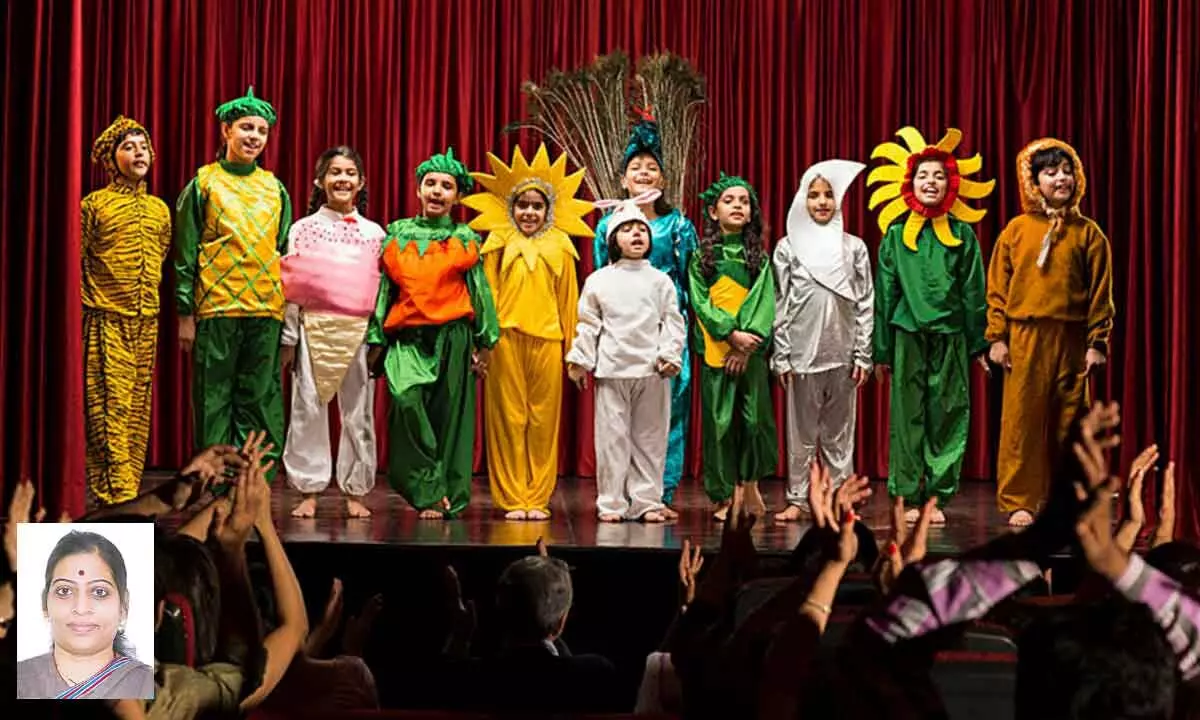Indian theatre can aid youngsters in comprehending social issues, language, culture and linguistic development

In today’s globalisd world, young people require a deep understanding of social issues, language, culture, and linguistic development for effective communication and participation. Indian theatre plays a critical role in education, entertainment, and social commentary, reflecting prevailing social issues, language skills, and cultural aspects. However, developing a pedagogy for incorporating Indian theatre into the curriculum presents challenges such as lack of resources, limited accessibility, and proper teacher training. Successful efforts have been made by schools and non-profit organisations to provide theatre education to young students, resulting in improved understanding of social issues, language, culture, and linguistic development
In today’s globalised world, young people require a deep understanding of social issues, language, culture, and linguistic development for effective communication and participation. Indian theatre plays a critical role in education, entertainment, and social commentary, reflecting prevailing social issues, language skills, and cultural aspects. However, developing a pedagogy for incorporating Indian theatre into the curriculum presents challenges such as lack of resources, limited accessibility, and proper teacher training. Successful efforts have been made by schools and non-profit organisations to provide theatre education to young students, resulting in improved understanding of social issues, language, culture, and linguistic development.
Collaborative efforts between theatre practitioners, educators, and researchers are needed to create an impactful and meaningful educational experience through Indian theatre plays. Indian theatre plays address social issues through dramatic performances, shedding light on topics like gender inequality, caste discrimination, religious tensions, and environmental concerns. Plays can help youngsters understand and engage with social issues through storytelling and character-driven narratives, acting as catalysts for critical thinking and encouraging active participation in creating positive change in their communities.
Enhancing language skills through Indian theatre
Indian theater plays can enhance language skills by exposing students to various language elements, improving vocabulary, syntax, and pronunciation, and encouraging active listening and response. However, there is a lack of concrete evidence regarding the effectiveness of theatre in language learning. Studies show that students who participated in theatre-based language learning activities showed greater improvement in their language skills compared to those who did not engage in such activities.
One of the main challenges in developing a pedagogy using Indian theatre to aid youngsters in comprehending social issues, language, culture, and linguistic development is the lack of resources and infrastructure. Many schools and educational institutions in India lack well-equipped theatre spaces, access to professional actors and directors, and financial support for theatre education. Limited availability of scripts and materials in regional languages also poses a challenge in implementing such a pedagogy at a larger scale.
Plays that showcase Indian culture, such as “Nirbhaya,” provide profound insights into Indian traditions, values, and beliefs, facilitating the development of language skills and enhancing cultural and linguistic understanding among youngsters. Talent can bridge cultural gaps, promote cultural understanding, and develop linguistic skills and cultural appreciation by exposing students to the richness and diversity of Indian languages. Overall, Indian theatre plays have a significant impact on the holistic development of young people and contribute to their overall educational experience.
Importance of linguistic development in Indian theatre
Linguistic development is crucial in Indian theatre, as it helps understand social issues, language, culture, and art forms. However, the development of pedagogy faces challenges due to the vast linguistic diversity in India and the lack of adequate training and resources for theatre practitioners. Plays can enhance linguistic skills, particularly in pronunciation, intonation, and accent, by exposing students to various accents and allowing them to imitate them. Examples of plays that focus on linguistics include “Pygmalion” by George Bernard Shaw, “Rosencrantz and Guildenstern Are Dead” by Tom Stoppard, and “Rosencrantz and Guildenstern Are Dead” by Tom Stoppard. Participation in theatre activities not only improves language proficiency but also enhances critical thinking, self-expression, and communication skills. Despite these challenges, the potential benefits of incorporating theatre pedagogy in Indian theatre are immense, as plays performed in Indian theatre provide a powerful means of engaging youngsters in learning and understanding social issues, language, culture, and linguistic development.
Challenges in developing pedagogy for Indian theatre in education
Developing pedagogy for Indian theatre in education faces challenges due to the vast cultural diversity in the country, lack of standardized assessment tools, and limited availability of resources and funding. Theatre education is often overlooked in the Indian education system, limiting students’ opportunities to develop creativity, critical thinking, and communication skills. This lack of emphasis on theater in the curriculum reinforces the stereotype that the arts are not a viable career option, hindering the holistic development of students.
Financial constraints and limited support hinder the development of pedagogical approaches that effectively incorporate theatre into the curriculum. Successful approaches include interactive performances, multimedia elements, and incorporating local languages and dialects in dialogues. These approaches have shown increased understanding and awareness among the youngsters, but addressing the diverse cultural and linguistic landscape of India is crucial for effective learning outcomes. A pedagogical approach should be inclusive, taking into account multilingualism and cultural diversity, and incorporating translations, adaptations, and regional languages and dialects in performances. A collaborative effort between educators, researchers, and artists is essential to overcome these challenges and develop a pedagogy that promotes holistic learning and understanding of social issues, language, culture, and linguistic development.
Conclusion
Indian theatre plays can significantly aid children in understanding social issues, language, culture, and linguistic development. By engaging with theatrical performances, students develop a deeper understanding of complex social issues and cultural contexts. Theatre also offers a unique platform for language learning and development, allowing students to visualise abstract ideas and connect with their learning. The experiential nature of theatre encourages active participation in the learning process, leading to a deeper understanding and appreciation of the subject matter. By incorporating theatre into the curriculum and supporting theatre organisations, India can transform education and society, creating a more informed and empathetic generation of citizens.
(The writer is an Assistant Director on deputation with the National Gallery of Modern Art, Ministry of Culture, New Delhi)








